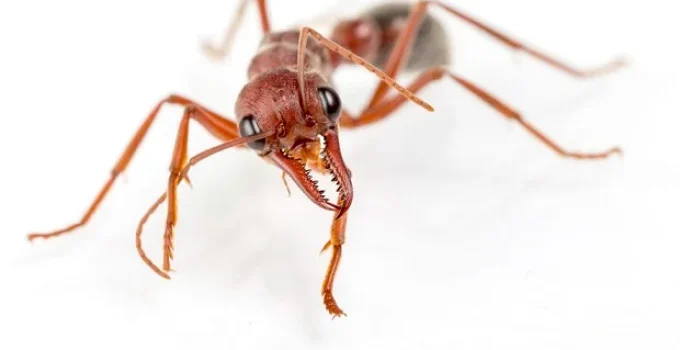Can Ants Smell?
Yes, ants can smell—and they do it exceptionally well. In fact, their sense of smell is their most powerful and essential sensory tool, far surpassing their vision or hearing. Ants rely on a highly developed olfactory system to find food, recognize nestmates, detect danger, and coordinate complex colony behavior.
Let’s explore the remarkable world of ant olfaction, from antennae to pheromone trails.
🧭 Dive Deeper
- How Ants Smell
- Pheromones: The Language of Ants
- Trail Following and Foraging
- Nestmate Recognition
- Can Ants Smell Humans?
- 🎯 Final Thoughts
- 📚 References
How Ants Smell
Ants “smell” using their antennae, which are loaded with thousands of olfactory receptors.
- Each antenna can have hundreds of sensilla—tiny hair-like structures that detect chemical signals.
- These structures house olfactory receptor neurons (ORNs) that respond to specific odor molecules.
- Ants detect airborne chemicals and surface-borne scents through direct contact.
📊 According to a study published in Genome Research, the genome of the Florida carpenter ant (Camponotus floridanus) contains over 400 olfactory receptor genes, compared to about 60 in humans [1].
Pheromones: The Language of Ants
Pheromones are chemical signals that ants produce to communicate with others. Ants release pheromones through various glands, and these signals influence the behavior of other ants.
Common types of ant pheromones include:
| Pheromone Type | Function |
|---|---|
| Trail pheromones | Guide nestmates to food sources |
| Alarm pheromones | Warn of danger or predators |
| Recruitment pheromones | Mobilize workers for group tasks |
| Sex pheromones | Attract mates during nuptial flights |
| Nestmate recognition | Distinguish colony members from intruders |
Ants can distinguish incredibly subtle differences in pheromone blends, which allows for precise communication.
Trail Following and Foraging
When a foraging ant finds food, it lays down a chemical trail back to the nest. Other ants then follow this path to the food source.
- The more ants follow the trail, the stronger the pheromone becomes.
- If the food source disappears, the trail fades quickly, and ants stop following it.
📊 One study found that Argentine ants can detect trail pheromones in concentrations as low as one femtogram per centimeter (10^-15 g/cm)—a sensitivity unmatched in most animals [2].
This pheromone-based trail system allows ants to efficiently exploit food sources with military-like coordination.
Nestmate Recognition
Ants also use chemical cues to determine friend from foe.
- Each colony has a unique chemical signature (a blend of hydrocarbons) on the cuticle of its members.
- Ants “smell” each other by touching antennae and sensing these hydrocarbons.
- If an unfamiliar scent is detected, ants will react aggressively.
This mechanism is essential to colony defense, preventing outsiders or rival colonies from infiltrating.
Can Ants Smell Humans?
Yes, ants can detect human odors, though not in the way we might think.
- Ants are sensitive to sweat, oils, and food residue on skin.
- They can follow trails left by sugar or grease, even in minute quantities.
- Some studies suggest ants can even detect volatile organic compounds (VOCs) associated with diseases.
📊 In a 2022 study published in Proceedings of the Royal Society B, researchers trained ants to detect cancer-related VOCs in urine samples, achieving over 95% accuracy in scent discrimination [3].
This incredible olfactory sensitivity opens the door to medical and diagnostic uses for ants.
🎯 Final Thoughts
So, can ants smell? Ants don’t just smell—they navigate, communicate, and survive through chemical detection. Their antennae are among the most advanced olfactory tools in the insect world, enabling them to:
- Follow trails
- Avoid enemies
- Recognize colony members
- Detect human scents
- Even assist in medical research
Their “chemical language” may be invisible to us, but for ants, it’s a world rich in signals, meanings, and complex behavior.
📚 References
- Piqueret, B., et al. (2022). Ants detect cancer cells through volatile organic compounds. Proceedings of the Royal Society B, https://doi.org/10.1098/rspb.2022.0423
- Smith, C. R., et al. (2011). Draft genome of the globally widespread and invasive Argentine ant (Linepithema humile). Genome Research, https://doi.org/10.1101/gr.121392.111
- Morgan, E. D. (2009). Trail pheromones of ants. Physiological Entomology, https://doi.org/10.1111/j.1365-3032.2009.00668.x
- Vanderbilt University – Research News – Ants have an exceptionally high-def sense of smell. https://news.vanderbilt.edu/2012/09/10/ants-have-an-exceptionally-high-def-sense-of-smell/
📌Learn More About Ants
- How Do Ants Reproduce?🐜A Deep Dive Into Colony Growth
- Do Ants Have Blood?🐜 The Surprising Truth about Insect Circulation
- Can Ants Smell? 🐜 Exploring the Chemical World of Ant Communication
- Can Ants Swim? 🐜 Exploring the Aquatic Abilities of Earth’s Hardest Workers
- Do Ants Eat Termites? 🐜 The Many Termite Predators
- Do Ants Have Brains? 🐜 Inside the Mind of Nature’s Minature Engineers
- Do Ants Have Muscles? 🐜 Explore What These Muscular Powerhouses Can Do
- Do Ants Sleep? 🐜 Ants Are Supersonic Power Nappers!
- How Long Do Ants Live? 🐜 A Look Into the Lifespan of the Colony
- What Do Ants Eat? 🐜 Inside the Pantry of an Ant Colony
- Are Ants Blind? 🐜How These Tiny Insects See the World
